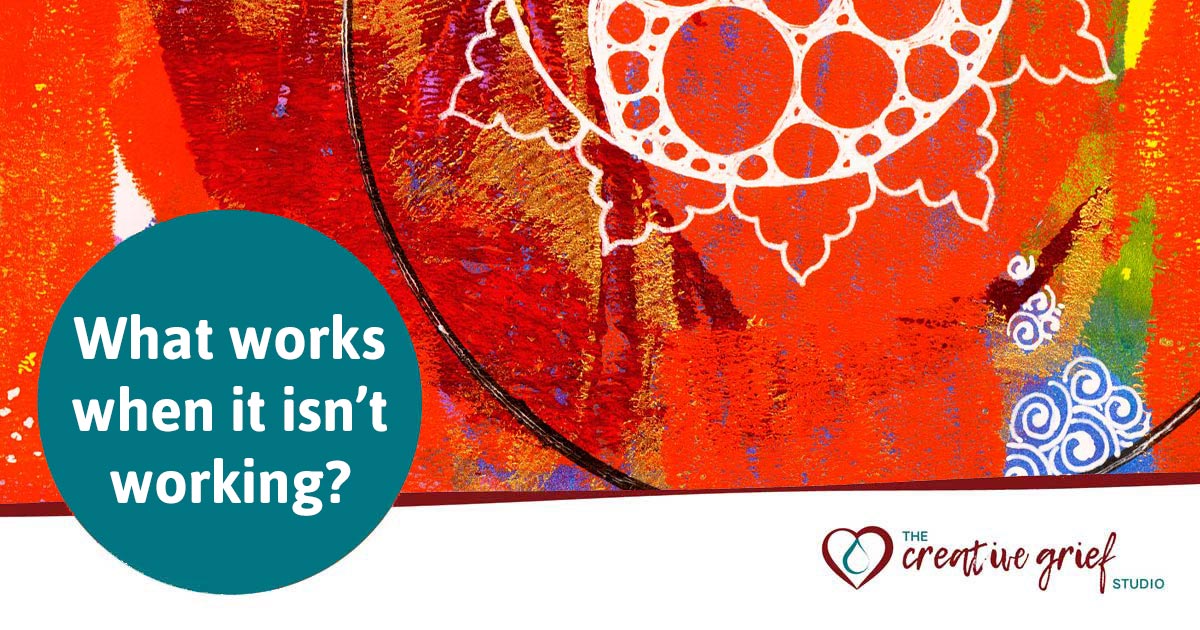It’s so important for us as grief support practitioners to experience what it’s like to be the client of a grief support service. There’s so much we can learn about how to approach our work as grief support practitioners with respect and humility, when we sit in the position of client. And hopefully, you’ve had a few different experiences as a client of grief support. Hopefully, you’ve had some wonderful experiences and also, hopefully, some really uncomfortable or truly terrible experiences as a client of a grief support service. Here at The Creative Grief Studio Program, we’d like to encourage you with the following:
Why should grief support practitioners experience bad grief “support”?
We’re pretty sure that most grief support practitioners are in this work because they really want to help people, and they’d be horrified if they ever realised that they were causing any hurt to a client. But sometimes it’s not easy to know whether what we’re doing with our client, or talking about with them, is helpful or hurtful. Our clients will rarely tell us if they’re finding the conversation judgmental, marginalising, invalidating, boring, or irrelevant. If you’ve ever been a client receiving bad grief support, you’ll have felt how uncomfortable this is, and you’ll understand why it’s so difficult to let your grief support practitioner know that the conversation or activity or relationship isn’t working for you.
Even if you work hard to set up an egalitarian and collaborative relationship with your clients, there are strong social discourses that can be a great obstacle to the open communication required in order to know that the conversation isn’t working for the client. Social discourses about “therapy” and even “coaching” set up the grief support practitioner as “the expert” who judges and advises, making it hard for clients to speak up. Our clients are statistically more likely to be women, and there are strong social scripts that discourage women from expressing their opinions, especially disagreeable opinions, and requests to have their own needs met.
So how can you develop strategies that work, for knowing when things aren’t working?
Develop your senses and skills for knowing when it isn’t working
- How do you notice when an idea or line of conversation you are having isn’t working?
What makes you first aware that this isn’t working? A feeling in your body? Thoughts in your mind? Signals that you see in the client’s body language or words? - To what degree do you take time to write up and reflect upon how things are going with each client?
- Do you participate in reflective and challenging supervision, rather than “cheerleading” supervision?
- How often, and in what way, do you ask your client’s for feedback?
- To what degree are you interested in and aware of the power inequalities and social discourses that disconnect you or your client from being able to see and talk about what’s not working?
Develop your client’s senses and skills for knowing when it isn’t working
- Are you teaching your client to ask themselves whether relationships, activities, conversations, etc are working for them, or are you deciding that for them?
- To what degree do you call upon your client to weigh up a situation against their own ethics or values or needs? How do you do this?
- How do you help your client to identify the ideas, relationships, politics, power dynamics, etc that try to blur their knowledge or articulation of their own ethics, values, needs, and preferences?
- To what degree do you invite your client to critique or deconstruct social discourses and ideas that separate them from living by their ethics or asking for what they need?
Develop a relationship and culture where it’s ok to speak about what’s not working
- Rather than waiting for a disconnect or misunderstanding to happen, how can you build into the everydayness of your working relationships the habit of reflecting on how the work together is going? Do you finish each session with a verbal reflection together? Do you ask your clients to participate in feedback informed processes? Do you make an anonymous feedback channel available for use?
- What language do you use for discussing how the work is going? Does the conversation flow more easily if you speak in relational terms of “How *we* are doing”?
- Do you give your client the opportunity to see how you deal with feedback and even criticism? For example, have they seen you respond to them or someone else who gave you critical feedback? What did you show them in that response? Is there a story you have about a time when you received critical feedback, which might give your client a sense of safety to give you critical feedback?
- To what degree does your general demeanour and way of speaking demonstrate humility and openness to learning or changing? Do you speak in totalities and certainties or do you speak with more nuance and tolerance for uncertainty?
- To what degree do you give advice or “teach” ideas, as opposed to interviewing your client about their unique experience and their ideas and forms of agency?
- To what degree do you explicitly call out any potential power imbalances or privileges that might set you up as more powerful in your relationship with your client?
- Do you raise conversations with your client when you suspect something you did or said was hurtful, invalidating, or irrelevant?
Do you know how to apologise?

